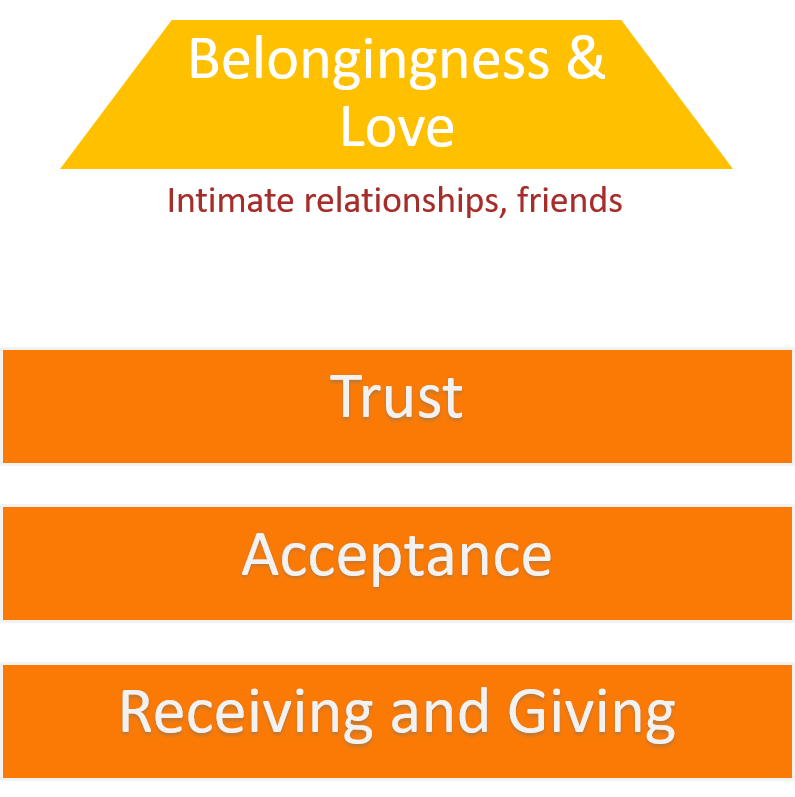
In Maslow’s research, being a part of a group is crucial for a person, be it at work, sports, friends or family. It is the connection that one build with another person. Research shows that a person who does not feel belonged or love is suspected to loneliness, social anxiety and clinical depression. The missing component of belong and love would cause inability for a person to function and maintain relationship in general.

What is Love or Belongingness?
In Maslow’s Hierarchy of Needs, Belongingness and / or Love comes after Physiological and Safety Needs. Belongingness refers to how one person feels to be in part of a group. This group includes friendship, intimacy, family, social groups, community groups or any organization. The emotional need the drives one person to build relationship with another is innate in every one of us. In this need, we look for trust, acceptance and it is about receiving and giving in return.
Trust
Trust is the basic condition to love. You want to trust and be trusted. You want to be relied upon – either by family member, friends or members. This can be seen in typical 2- to 3-year-olds who has never ending energy to offer help and assistance – sweeping the floor, carry grocery, pushing shopping cart. As much as their efficiency or ability to complete the task is at minimal, they are eager to perform the task. They feel proud when parents allow them to do the task.
Conversely, if a child’s offer to help is rejected or when they were reprimanded for not doing the task well, they can feel rejected.
Acceptance
When you truly love someone, you would accept them they way they are – all the perfections and imperfections. Acceptance is an importance criterion to self-worth. If you are constantly being told that you are not good enough, you will start to doubt if the person truly loves you, or accept the way you are.
This may appear harsh on some children as parents have high expectation of their children. Parents want the best for their child, thus, often strive to provide the best for their child. And because they provide the best, they want their child to fully utilize the best opportunity provided. However, in the process of learning, sometimes we make it, sometimes we don’t. Thus, children may feel that parents are not accepting them because of the failure.
Receiving and Giving

In all relationships, there must be a 2-way traffic. As you receive, you will also give. Each one of us express differently. In The Five Love Languages by Dr Gary Chapman, he shares his ideas of how one person expresses their love, namely word of affirmation, quality time, physical touch, acts of service and receiving gifts. By knowing how the other person expresses their love or communicating how you would like to receive love, it eases the route one would need to take to feel belonged and loved.
What can you do as parents?
Here are some suggestions to channel your love to your child
- Allow your child to assist you. Though they may not do a perfect job, or in some cases, created more mess than intended, your child will feel that you trusted them to complete the job. Thus, it will their confidence as well as competency in performing the job. Over time, their skill will be better.
- Let your child know that you love them nonetheless when they fail to perform to your expectation. When they lose a competition (because they did not practice hard enough), check in with them how they can do better the next time. When a child loses a game or competition, they do not need us to rub salt to the wound.
- Learn what is your child’s love language and let your child know your love language. If your child requires physical touch to feel love, teach them to ask for a hug if they needed one and vice versa. Understand each love languages’ dos and don’ts. It will short cut away a lot of misunderstanding in a relationship.
What are you going to do to show love to your loved ones?
Read more Is your child feeling safe? From Maslow’s Hierarchy of Needs perspective.